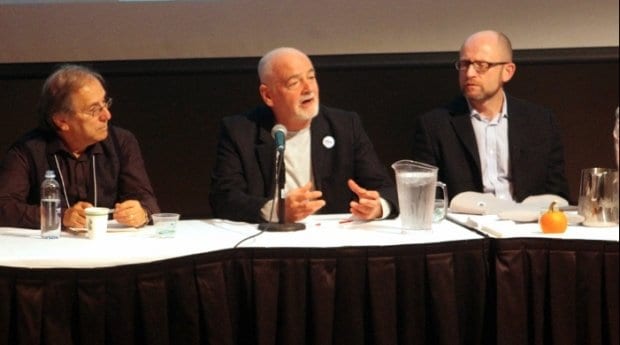The long-term health and well-being of gay men rests not only on the availability of healthcare services, but also on the capacity of professionals to understand and effectively communicate the ever-increasing torrent of health information.
The 10th annual Gay Men’s Health Summit, organized by the Community-Based Research Centre (CBRC) in collaboration with the BC Centre for Disease Control and the Health Initiative for Men, focused on gay men’s health literacy. Health literacy is defined by the Public Health Agency of Canada as “the ability to access, comprehend, evaluate and communicate information as a way to promote, maintain and improve health in a variety of settings” throughout life.
The summit, which took place at Simon Fraser University Harbour Centre from Oct 29 to 31, was the largest to date, with more than 200 attendees and more than 50 presentations, workshops and performances.
Irving Rootman, a leading Canadian researcher in health literacy, who delivered the keynote address, said health literacy improves navigation of the healthcare system. It boosts the ability to share information with providers, enhances self-management, decision-making and advocacy, and helps reduce health risks while improving health outcomes and longevity.
In a panel discussion on the future of gay health literacy, CBRC’s Terry Trussler called on all gay health organizations to increase health literacy, suggesting it may be time to establish an institute on health communication for gay men’s health.
“We’ve talked a lot about literacy, the level of literacy and types of literacy, but we haven’t talked about raising literacy, and that’s the one kind of key thing that the CBRC has done,” he said. “This summit, when we developed it 10 years ago, was our model of raising the literacy of agencies in doing their work. We’ve been getting better and better at it.”
Paul Flowers, a professor of sexual health psychology at Glasgow Caledonian University in Scotland, said that researchers need to ensure that health literacy is accessible to as many gay men as possible.
“I think we’re all committed to a kind of research-based or some kind of evidence-based thinking,” he noted but added it’s critical to find out who is not able to participate in the research because of literacy or other communication issues. “We have to be mindful of trying to think in interviews and research about how to address our research methods so they include a much wider group of people.”
In addition to the overarching themes of health literacy, presenters addressed developments in HIV testing, suicide among gay and bisexual men, the impact of racism on the sexual health of South Asian communities, and for the first time held an expert panel workshop on cancer prevention for gay men.
Stacey Berisavac, of the Canadian Cancer Society, spoke about its Get Screened program, which strives to increase breast, cervical and colon cancer screening rates among LGBT people in Hamilton, Ottawa and Toronto.
“We know that regular screening for cancer is effective for the prevention of cancer and detecting it in the earlier stages, which increases the odds of a positive outcome,” she said. “What we also know about screening is that it is lower amongst LGBTQ [people].”
Evidence from cancer screening is limited, she noted, but many researchers suggest that LGBT people in Canada face significant barriers in achieving good health because their needs are poorly understood and because healthcare institutions may not be inclusive or welcoming to them.
Carolyn Gotay, the Canadian Cancer Society chair in primary prevention at the University of British Columbia, pointed out that it’s difficult to gauge cancer rates in gay men because of the absence of sexual-orientation data in demographic studies such as the census.
She said the best estimates on gay men’s health come from such surveys as the 2011 California Health Interview Survey, which found that gay men have higher rates of various forms of preventable cancer. She also cited a 2012 Toronto-area study that suggests gay men have an increased risk of developing lung cancer. The Toronto Rainbow Tobacco Survey found that 33 percent of gay men were smokers compared to 21 percent of straight men.
Gotay noted that research also shows that gay men are less likely to be obese and more likely to exercise. “Gay men do have better indicators in some areas [like] muscle strengthening and weight control, so it’s not all a negative picture,” she told the conference. “At least some of the cancers people experience are potentially preventable if people know there are things they can do that increase their chances of staying healthy. That’s the message I’d like to get across.”
For more information, visit cancerprevent.ca

 Why you can trust Xtra
Why you can trust Xtra


